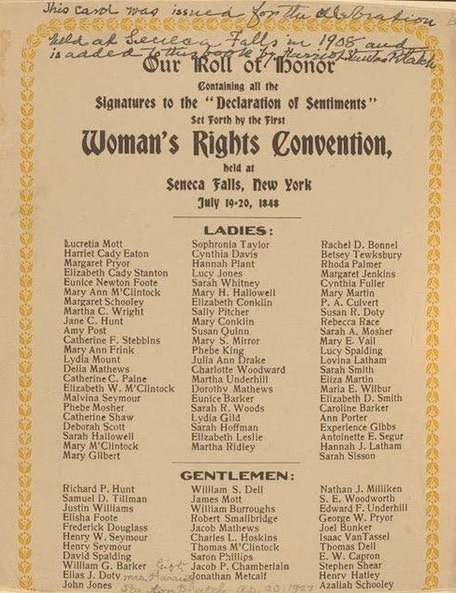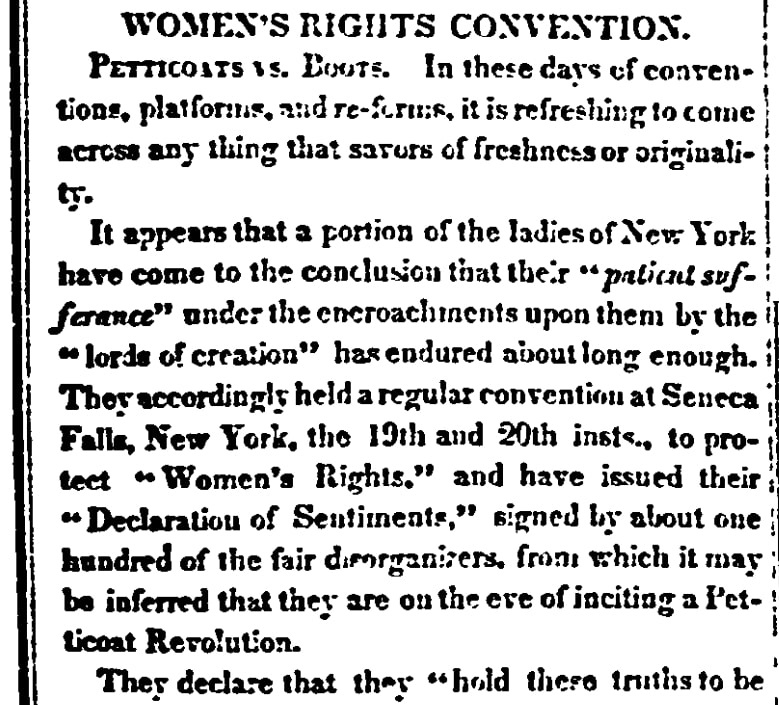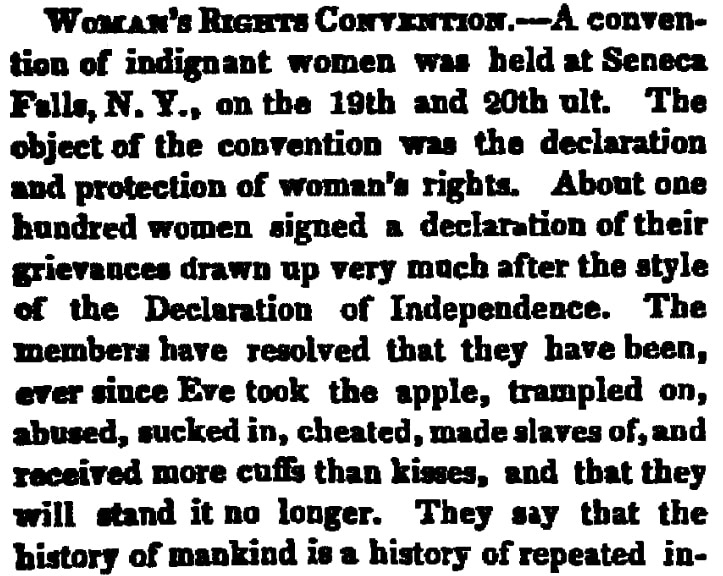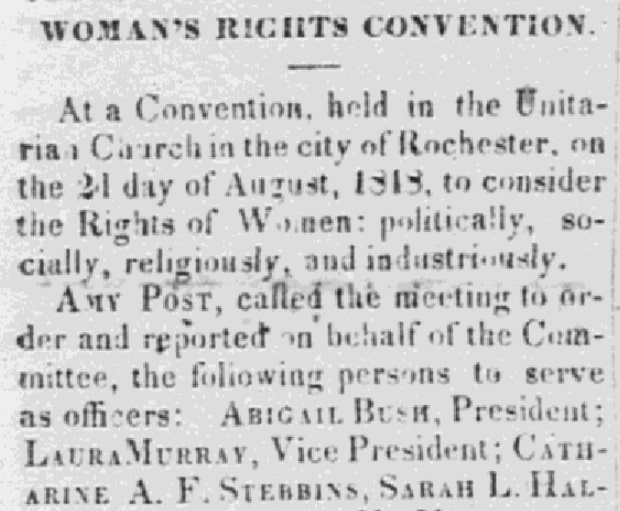The women’s rights movement in America was energized by the National Women’s Rights Convention held in Worcester, Massachusetts, in October 1850. Two years earlier, however, another important meeting of women – and some men – made suffrage a key goal of the women’s rights movement during a two-day convention convened on 19 July 1848, in Seneca Falls, New York. Over 300 people attended the convention, including famed speaker Lucretia Mott, a Quaker from Boston, and abolitionist Frederic Douglass.
The focus of the Seneca Falls Convention was the reading and discussion of a statement of women’s rights called the Declaration of Sentiments, primarily written by Elizabeth Cady Stanton. After much debate, the declaration (deliberately modeled after the Declaration of Independence) was signed by 100 of the participants: 68 women and 32 men.

Of the 12 resolutions debated and approved at the convention, the most controversial was the ninth, written by Stanton. It read:
“Resolved, that it is the duty of the women of this country to secure to themselves their sacred right to the elective franchise.”
Women’s suffrage was a divisive issue and many of the convention’s participants opposed its inclusion, including Mott, fearing that an element this controversial would weaken support for women’s equality. However, others argued persuasively in favor of supporting women’s suffrage, including Frederic Douglass – the only African American at the convention – and in the end the voting rights resolution was approved.
The Declaration of Sentiments and the resolutions were published in many newspapers, spurring much private and public debate, beginning the long uphill climb that culminated when the 19th Amendment to the U.S. Constitution, ensuring women’s right to vote, was ratified on 26 August 1920.
The following three newspaper articles give an indication of how news of the Seneca Falls Convention and the Declaration of Sentiments was spread. The first two focus on the Seneca Falls Convention. The third, published in Douglass’s own newspaper, reports on a follow-up convention held two weeks later in Rochester, New York, at which both Mott and Douglass again spoke, at the conclusion of which 107 participants signed the Declaration of Sentiments.

Here is a transcription of this article:
WOMEN’S RIGHTS CONVENTION.
Petticoats vs. Boots. In these days of conventions, platforms, and reforms, it is refreshing to come across anything that savors of freshness or originality.
It appears that a portion of the ladies of New York have come to the conclusion that their “patient sufferance” under the encroachments upon them by the “lords of creation” has endured about long enough. They accordingly held a regular convention at Seneca Falls, New York, the 19th and 20th insts., to protect “Women’s Rights,” and have issued their “Declaration of Sentiments,” signed by about one hundred of the fair disorganizers, from which it may be inferred that they are on the eve of inciting a Petticoat Revolution.
They declare that they “hold these truths to be self-evident that all men and women are created equal,” and that all “governments derive their just powers from the consent of the governed,” &c. &c.
The following are among the specifications against their inhuman oppressors:
“The history of mankind is a history of repeated injuries and usurpations on the part of man toward woman, having in direct object the establishment of an absolute tyranny over her. To prove this, let facts be submitted to a candid world.
“He has never permitted her to exercise her alienable right to the elective franchise.
“He has compelled her to submit to laws in the formation of which she has had no voice.
“Having deprived her of this first right of a citizen, the elective franchise, thereby leaving her without representation in the halls of legislation, he has oppressed her on all sides.
“He has made her, if married, in the eyes of the law, civilly dead.
“He has taken from her all right in property, even to the wages she earns.
“He has made her morally, an irresponsible being, as she can commit many crimes with impunity, provided they be done in the presence of her husband. In the covenant of marriage she is compelled to promise obedience to her husband, he becoming to all intents and purposes her master – the law giving him power to deprive her of her liberty and to administer chastisement.
“After depriving her of all her rights as a married woman, if single, and the owner of property, he has taxed her to support a government which recognizes her only when her property can be made profitable to it.
“He has denied her the facilities for obtaining a thorough education – all colleges being closed against her.
“He has endeavored in every way that he could, to destroy her confidence in her own powers, to lessen her self-respect, and to make her willing to lead a dependent and abject life.”
In support of their positions and views, they are about to employ agents, circulate tracts, present petitions to the state and national legislatures, and “enter upon the great work” before them, with zeal and activity; endeavoring to enlist both the pulpit and the press in their behalf.
They appear, however, just a little doubtful about the propriety and delicacy of their proceedings, for they proclaim that they “anticipate no small amount of misconception, misrepresentation, and ridicule” upon their efforts, but they are bound to go it, nevertheless.
This will do pretty well for leap year – but if they go on in this way, there is no telling what they may bring forth, eventually.

Here is a transcription of this article:
WOMAN’S RIGHTS CONVENTION.
A convention of indignant women was held at Seneca Falls, N.Y., on the 19th and 20th ult. The object of the convention was the declaration and protection of woman’s rights. About one hundred women signed a declaration of their grievances drawn up very much after the style of the Declaration of Independence. The members have resolved that they have been, ever since Eve took the apple, trampled on, abused, sucked in, cheated, made slaves of, and received more cuffs than kisses, and that they will stand it no longer. They say that the history of mankind is a history of repeated injuries and usurpations on the part of man towards woman; that man won’t let woman vote; that he won’t allow her to go to college; that he taxes her “to support a government which recognizes her only when her property can be made profitable to it”; “that all men and women are created equal,” &c. &c. They intend to circulate tracts and documents, and employ agents, and petition Congress, and get up a feminine agitation generally.

Here is a transcription of this article:
WOMAN’S RIGHTS CONVENTION.
At a Convention, held in the Unitarian Church in the city of Rochester, on the 2d day of August, 1848, to consider the Rights of Women: politically, socially, religiously, and industriously.
…Frederick Douglass remarked that the only true basis of rights was the capacity of individuals, and as for himself he dared not claim a right which he would not concede to women. In reference to the enfranchisement of women, it need not be questioned whether she would use that right or not; he contended that man should not withhold it from her; he alluded to the oppressive customs in the Old World, which so wronged woman, that they subjected her to the most laborious as well as degrading means for a livelihood. He would see her elevated to an equal position with man in every relation of life.
…Mrs. Mott said our aim should be to elevate the lowly and aid the weak. She compared the condition of woman with that of the free colored population, and dwelt upon the progress they had made within the past few years, urging imitation of their perseverance through opposition and prejudice – and said, while woman is regarded as an inferior being – while the Bible is brought forward to prove the right of her present position, and while she is disposed to feel satisfied with it, all these efforts can do but little. We cannot expect to do much by meeting in convention for those borne down by the oppressor, unless the oppressed themselves feel and act; and while so little attention is paid to education, and so little respect to woman. She spoke of the education of boys and girls in England. The common schools for boys show an improvement, mathematics and many of the higher branches being taught; while the girls learn little more than to read, write and keep their little accounts – sewing being the principal object of attention. The teachers say it will not do to educate them, “you unfit them for servants.” We grant that woman’s intellect is feeble because she has been so long crushed. Does one man have fewer rights than another, because his intellect is inferior? If not, why should woman be denied her rights for that reason? Let her arise and demand them, and in a few years we shall see a different mental development. She regarded this as the beginning of the day when woman shall rise, when she shall occupy her appropriate position in society.
Note: An online collection of newspapers, such as GenealogyBank’s Historical Newspaper Archives, is not only a great way to learn about the lives of your ancestors – the old newspaper articles also help you understand American history and the times your ancestors lived in, and the news they talked about and read in their local papers. Did any of your ancestors participate in the Women’s Suffrage Movement? Please share your stories with us in the comments section.
Related Articles:
